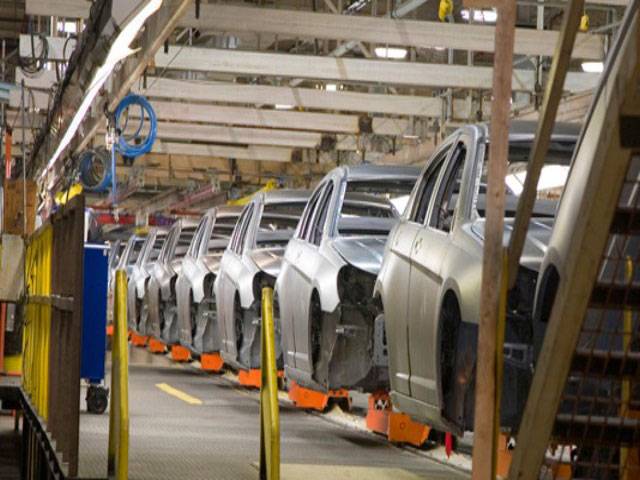Lahore - Automotive Development Policy 2016-21, which paves the way for new international car manufacturers to enter the local market to boost competition with a view to enhance consumer welfare, has also ensures greater localization of auto parts. In case the new entrants were unable to achieve the targets of deletion programme, they would be penalized, said officials of Engineering Development Board.
They said that now the international companies like Fiat, Audi or Volkswagen can establish their plants in the country without any further delay as the policy gives them several incentives.
They stated that policy’s main objectives are ‘higher volumes, more investment, enhanced competition, tariff rationalization and consumer welfare’.
“The new policy seems to entice new investors and revive closed assembling facilities with concessional import duty for 5 and 3 years, respectively. The policy extends also concessions to existing OEMs, decreasing CKD import duty rate to 30 percent/45 percent for non-localized/localized parts, said FPCCI former president and Guard Group chairman Iftikhar Malik.” He said the basic thrust should have been to provide incentives to both existing and new entrants simultaneously. He suggested that a board should be constituted comprising representatives from auto parts vendors, OEMs, EDB, Board of Investment, Ministry of Commerce and Industry, Ministry of Planning and Development and FBR to keep a check on deletion target of the new entrants, as earlier no target has been achieved in this regard. “The OEMs were also given targets of technology transfer and deletion programmes in last auto policies but these were never implemented in true spirit,” the Guard Group chairman added.
He said that after 5-year of economic stagnation, the small and medium sized businesses were looking forward to an enabling environment for their businesses to grow and contribute towards Pakistan’s economy but it has been disappointed by the government policies, Iftikhar Malik added.
The FPCCI former chairman said that the auto sector which consists of passenger cars tractors, trucks, buses, LCVs and 2/3-wheeler assemblers is supported by 3,000 APM companies which provide 3 million direct and indirect jobs to skilled workers, technicians, engineers and management professionals in the country. This sector is one of the top 3 contributors to government tax revenues and LSM growth in Pakistan. This sector is fully documented and part of the formal economy.
An official from Honda Cars counted contribution of car makers to the economy. They invested billions of rupees besides providing jobs, saving foreign exchange and assuring the government of introducing new models, but the government is not ready to acknowledge their role. He claimed that incentives to new entrants with tax and duty benefits will not yield any result.
Chief Operating Officer of Indus Motors Company Ali Asghar Jamali said that the company remains committed to uphold the spirit of continuous localization as cornerstone of its strategy. “We are proud of the localization achieved in 25 years since formation. Through the efforts of local vendors and suppliers, we were able to achieve over 65% localization in Corolla. We are continuously working with the local suppliers and vendors to implement supplier improvement initiatives aimed to achieve quality alignment with the outside world so that Pakistan’s automotive industry becomes globally competitive”.
PAAPAM former chairman Nabeel Hashmi feared missing the goal of achieving seven per cent growth by 2018. He said that currently, four of the top 10 global auto assemblers are producing cars in Pakistan, utilising up to 70pc local parts. The sector is supported by 3,000 auto parts manufacturers (APMs) providing three million direct and indirect jobs.
He said that the auto policies in countries such as China, India, Thailand, Korea and Indonesia etc are targeted to act as catalysts for growth of investments, government revenue generation, building capacities and creating employment in their respective countries.
Association of Pakistan Motorcycle Assemblers Chairman Sabir Sheikh said the auto policy had nothing for Chinese-bike assemblers, as several Chinese bike assemblers were on the verge of collapse but the government looked least bothered.
The bike industry had been surviving on old policies when one dollar was equal to Rs60, he said, adding that no tariff incentives had been given when one dollar now equals Rs106.
All Pakistan Motor Dealers Association Chairman M. Shahzad said used car importers were ignored in the new policy, as used car dealers have never asked for any duty reduction, whereas the local car assemblers are given duty concession without any condition of price cut to facilitate consumers.
He demanded the import of used cars on a commercial basis which was already allowed to the assemblers in the form of new completely built-up units.
PAAPAMr chairman Mumshad Ali stated that encouraging the auto industry already existing in the country would have been the best option available to the government to speed up economic growth, attract foreign investment & create massive employment opportunities. Aamir Allawala, the former Paapam chairman, added that this illegal activity has created black economy of Rs 67 billion in 2015 as foreign exchange for vehicles was paid through Hawala channel and sale activity was done in cash or through fake accounts.
He said fixed duties under SRO-577 are suppressed by 30% and the import of 45,013 used cars cost Rs 67 billion to the national exchequer in 2015,’ said Aamir.
Thursday, April 18, 2024
ADP 2016-21 ensures auto parts greater localisation
Experts suggest new board to monitor deletion target by new entrants

Taylor Swift fans lose £1m in scams
April 18, 2024
Qawwal Aziz Mian remembered on 82nd birth anniversary
April 18, 2024
Climate change will make you poorer, says a new report
April 18, 2024
Political Reconciliation
April 16, 2024
Pricing Pressures
April 16, 2024
Western Hypocrisy
April 16, 2024
Policing Reforms
April 15, 2024
Storm Safety
April 15, 2024
Workforce inequality
April 17, 2024
New partnerships
April 17, 2024
Shikarpur crisis
April 17, 2024
Peace quest
April 17, 2024
Democratic harmony
April 16, 2024
ePaper - Nawaiwaqt
Advertisement
Nawaiwaqt Group | Copyright © 2024





